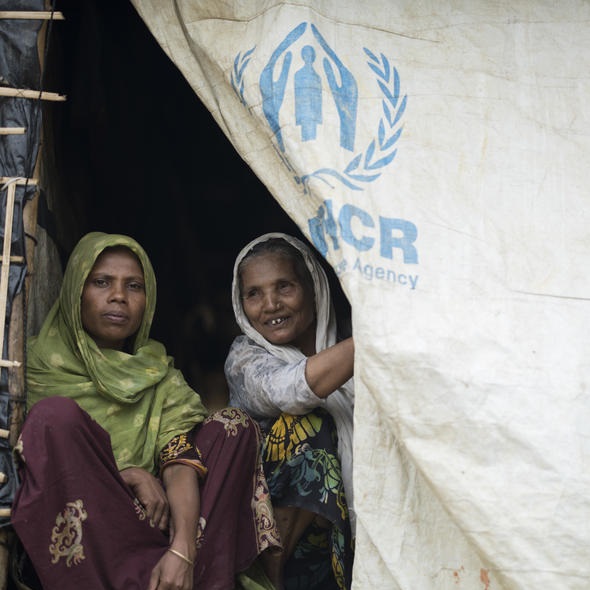Evaluation of Community-Based Protection and Solutions Programme in Priority Areas of Return and Re-integration in Afghanistan, Key Informants Interviews - March 2021
Afghanistan, 2021
Get MicrodataIdentification
UNHCR_AFG_2021_PARR_March_KII_v2.1
Evaluation of Community-Based Protection and Solutions Programme in Priority Areas of Return and Re-integration in Afghanistan, Key Informants Interviews - March 2021
| Name | Country code |
|---|---|
| Afghanistan | AFG |
Integrated Survey (non-LSMS) [hh/is]
Following the influx of refugee-returnees from Pakistan and Iran in 2016, UNHCR has been supporting the Government of the Islamic Republic of Afghanistan’s (GoIRA) Ministry of Refugees and Repatriation (MoRR) through a series of programmes aimed at providing durable solutions for returnees and long-term displaced populations in Afghanistan. 20 locations were identified by UNHCR and GoIRA as Priority Areas of Return and Reintegration (PARR locations). In these locations, large populations of refugee-returnees, internally displaced persons (IDPs) and host communities live together. Within these PARR locations, UNHCR implemented its short and medium-term Community-based Protection and Solutions Programme Response (CO-PROSPER) programmes to promote long-term development initiatives. UNHCR aimed to develop an area-based, humanitarian-development-peace triple nexus response to support durable solutions and create conducive conditions for the sustainable reintegration of displaced persons.
To understand the impact of these programmes on the PARR locations, IMPACT Initiatives (IMPACT) conducted an evaluation of the impact of the programmes in PARR locations across four different dimensions: 1) community leadership inclusivity, 2) strengthening public services and equitable access, 3) income generation and economic empowerment, and 4) peacebuilding, and created indices to measure progress over these four key objectives that can be compared against the programme goals.
In order to conduct this assessment, a mixed-method approach was used with two structured tools with separate methodologies to assess each site as follows.
A HH level tool was used to interview a representative sample of HHs in each of the 20 PARR locations, with a 95% confidence level and a 10% margin of error. While aggregated (to the overall HH level) results are representative by population group (IDPs, refugee-returnees, and host communities) and by location, findings per population group in the locations are indicative only.
In addition, Key Informants (KIs) were interviewed to assess community leadership in each of the 20 PARR locations to provide indicative information on infrastructure, service presence, stakeholder presence, and conditions faced by specific displacement groups in each site. Nine KIs were interviewed in each location (except for three locations).
Between 21 February and 5 March 2021, 2,039 HHs and 168 KIs were interviewed across all 20 PARR locations
Aggregate data [agg]
Key Informant Interviews
Version
v2.1: Edited, cleaned and anonymised data.
2022-05-30
Scope
The scope includes:
- local governance structures
- feedback mechanisms
- conflict resolution mechanisms
- Employment and Livelihoods Opportunities
- Cooperatives
- Education
- Access to health
- Protecion
- Shelter
- Group support
| Topic |
|---|
| Health |
| Education |
Coverage
Shash Pool and Qashqa, Nilli, Tarakhail Daag, Ghaziabad, Aka Khail Area, Laghmani, Qala-e-Nasro & Bini Warsak, Majboorabad, Charbagh, Daman, Shekh Mesri, Aziz Khan Kas, Noor Abad, Sakhi Camp & Qalin Bafan, Sher Khan Bandar, Loya Wala, Mirwais Mina, Kahdistan, Jebrial
Identified key informants representing targeted population groups
Producers and sponsors
| Name |
|---|
| UNHCR |
| IMPACT |
Sampling
KIIs were conducted with 168 community leaders with knowledge of their location (9 KIs in 17 locations, 6 in 2 locations, and 3 in 1 location) (table 1). These leaders may have been selected either formally or informally, and represented either refugee-returnees, IDPs, host communities, or a combination of these three groups. As such the aim was to try and have 3 KIs per population group, for approximately 9 interviews for each of the 20 PARR locations. In many cases, community leaders represented more than one population group. The KI survey focused on infrastructure, the presence of services, and stakeholder presence, to provide additional information on each site and location to complement HH survey findings.
Data collection
| Start | End |
|---|---|
| 2021-02-23 | 2021-03-02 |
| Name |
|---|
| IMPACT |
Data Access
UNHCR, IMPACT (2021). Afghanistan: Evaluation of Community-Based Protection and Solutions Programme in Priority Areas of Return and Re-integration in Afghanistan, Key Informants Interviews - March 2021. Accessed from: https://microdata.unhcr.org
Contacts
| Name | Affiliation | |
|---|---|---|
| Curation team | UNHCR | microdata@unhcr.org |
Metadata production
UNHCR_AFG_2021_PARR_March_KII_v2.1
| Name |
|---|
| UNHCR |
2022-05-31
